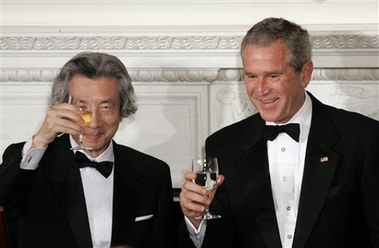Asia-Pacific
Bush, Koizumi warn N. Korea against test
(AP)
Updated: 2006-06-30 08:52
 |
Large Medium Small |
Side by side, President Bush and Japanese Prime Minister Koizumi warned North Korea on Thursday to cancel any plans to test-fire a long-range missile, with Bush bluntly calling a launch unacceptable and Koizumi hinting at the punishment that would result.
 President Bush toasts Japan's Prime Minister Junichiro Koizumi at an official dinner at the White House in Washington, Thursday, June 29, 2006. [AP] |
"The leader of North Korea is just going to have to make a decision," Bush said at a joint news conference with Koizumi that followed two hours of Oval Office discussions. "Does he want to be isolated from the world or is he interested in being an active participant in the nations of the world?"
Koizumi said he and Bush discussed what actions would be taken if Pyongyang followed through on its apparent preparations to launch a Taepodong-2, which has a range that could reach Alaska or perhaps the U.S. mainland.
"We would apply various pressures," Koizumi said through a translator. "I believe it is best that I do not discuss what specific pressures we were talking about."
From a South Lawn arrival featuring trumpet fanfare and canon fire to a gala black-tie dinner of Kobe beef raised in Texas, Bush and Koizumi celebrated five years of friendship. Koizumi leaves office in September, depriving Bush of one of his most ardent defenders on the world stage.
The prime minister is a huge fan of Elvis Presley, and Bush on Friday will take Koizumi to Memphis for a private tour of the late singer's estate, Graceland.
"Officially he's here to see the president," Bush said, "but I know the highlight of his visit will be paying his respects to the king." Bush gave Koizumi a juke box loaded with Elvis songs.
Koizumi had a line of his own ready: "Thank you very much, American people," he said at the end of the news conference, "for 'Love Me Tender.'"
At an East Room news conference, neither Bush nor Koizumi said what consequences North Korea might face for a missile test. Diplomatic condemnation is the most likely first response, followed by targeted economic sanctions and possibly a United Nations Security Council resolution. Japan has said it would consider food sanctions against North Korea, a stance that goes against U.S. policy.
Intelligence reports began detecting activity related to a test-firing about two weeks ago, and it remained unclear how far along the preparations are. Lt. Gen. Michael Maples, director of the Defense Intelligence Agency, said Thursday that "there are a variety of assessments as to whether a launch will occur and, if so, what type of launch it will be."
Bush demanded that North Korean leader Kim Jong Il let the world know his plans. "There have been no briefings as to what's on top of the missile. He hasn't told anybody where the missile's going," the president said.
He added: "Launching the missile is unacceptable."
The words on North Korea were about the only tough talk from Bush and Koizumi throughout a day of elaborate ceremony that put their virtually tension-free alliance and their personal friendship - front and center.
Bush effusively applauded decisions under Koizumi's watch to lift a ban on U.S. beef imports, realign American troops in Japan and help confront North Korea over its nuclear weapons programs.
"You've had a remarkable tenure as the prime minister of your country," Bush said. "You have led with courage. You have made hard decisions. You've helped us change our relationship so that Japan and the United States will be able to work even closer together in the 21st century."
But it was Koizumi's decision to send Japanese troops to the U.S.-led coalition in
Iraq that got the most attention from Bush. He was notably candid that the support shaped his positive view of the leader like nothing else.
For Koizumi's benefit, Bush reprised several times his take, now familiar to anyone who hears the president's speeches, on the transformation in the U.S.-Japanese relationship, from a time when the American president's father fought the Japanese to 60 years later when Bush and Koizumi collaborate on spreading democracy.
"It strikes me as just amazing," Bush said. "A lot of people take it for granted. I don't. Because 60 years ago, we were at war."